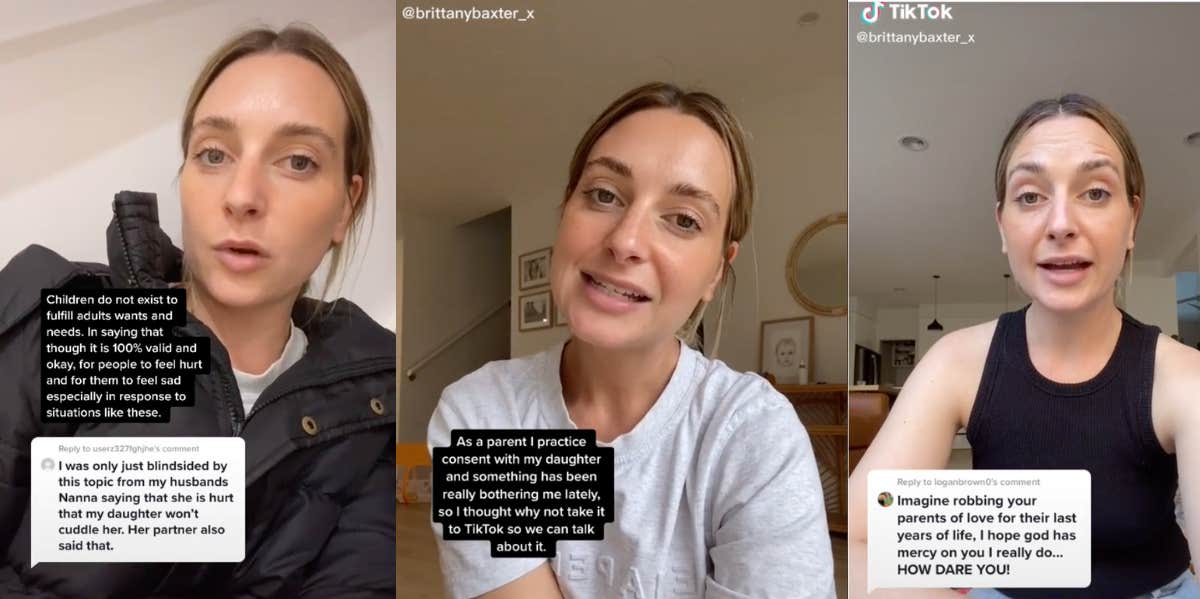Mom Makes Daughter's Grandparents Ask For Consent Before Hugging Her & Doesn't Care That Their 'Feelings Are Hurt' If She Says 'No'
Affirmative consent is more important than hugging a grandparent.
 TikTok
TikTok Brittany Baxter is a mom with a Bachelor's Degree in Psychological Science. She’s also a certified life coach, and she ran a body image coaching business until she became pregnant with her daughter.
She is also a fierce advocate for children’s bodily autonomy. A TikTok post in which she defends children’s rights to their own bodies recently went viral, receiving over 100,000 likes.
The Gottman Institute champions “a research-based approach to relationships” when it comes to teaching kids about consent. They maintain that talking about consent with children should be an ongoing conversation, and practicing the act of “giving children simple choices every day ] to] show them that they have bodily autonomy so that they can carry that into other interactions.”
RELATED: Mom Shares How She's Teaching Her 2-Year-Old Daughter About Consent
Baxter makes relatives ask for consent before hugging her daughter.
Baxter, too, believes in those choices, specifically focusing on what her young daughter chooses to do with her body. Baxter began her post with the request that society “please start normalizing the fact that kids do not have to kiss and hug adults.”
“My daughter is almost two years old and I’ve been in the process of teaching her consent basically since the day she’s been born,” Baxter explains.
“I find it really f–ing unhelpful when the adults in her life are like, 'what, we have to ask for a kiss and a hug' even though I’ve explained why multiple times and then when she says no, they’re like, 'oh, she doesn’t love me, my feelings are so hurt,' and then they proceed to overstep her body boundaries anyway.”
Baxter continues to defend her position on bodily autonomy, claiming, 'my daughter and her body do not exist to make anyone feel more comfortable and to make anyone feel loved.'
“It’s not her fault and it’s not my fault that the older generation haven’t taken the time throughout their entire lives to learn how to regulate their emotions [and] feelings so consent doesn’t continue to be overlooked,” Baxter states.
“No one’s feelings are ever going to be more important than my daughter’s right to her own body.”
“I’m sure as s–t not going to allow her to grow up in an environment where she doesn’t know how to say no and she doesn’t know what it looks like for her ‘no’ to be respected.”
“Grandparents, do better,” Baxter states at the end of the video.
Speaking to the importance of consent, bodily autonomy, and boundaries, Baxter says, “If you think at any time it is okay to force a child to do something they don’t want to do when they’re communicating to you that they don’t want to do it… by doing that to a child, you are telling them that you don’t see them, you don’t hear them, and you don’t value their wants and needs, and that their wants and needs are less important than the needs of others.
“Under no circumstance should that be okay, just because they are a child. Children do not exist to fulfill adults’ wants and needs.”
Baxter understands that the situation is a sensitive one for grandparents. She believes that “it is 100 percent valid and okay for people to feel hurt and for them to feel sad, especially in response to situations” when a beloved child doesn’t want to show affection.
“Rejection is not a nice thing,” Baxter explains. “if you have the capacity to do so, you should hold space for that person’s feelings. Meet them with compassion, meet them with empathy, and meet them with sympathy.”
“At the end of the day, though, our feelings are our own. They’re our responsibility and we need to take ownership of them. We need to do the work in order to manage and ease the discomfort around situations like this and how we feel.”
“We cannot expect people to fix how we feel, especially at the expense of their own bodily autonomy,” Baxter exclaims.
Most importantly, Baxter notes that “children do not owe us anything.”
“If we feel triggered by the fact that we’re not getting what we want and need, that’s our work to do. Not theirs.”
Alexandra Blogier is a writer on YourTango's news and entertainment team. She covers celebrity gossip, pop culture analysis and all things to do with the entertainment industry.
